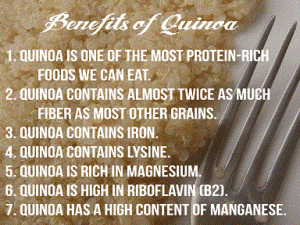Quinoa, the wonder grain! Actually, it’s a seed native to the Andean region of South America. Quinoa is a cereal grass just like wheat however it’s gluten free, high in protein, and because of it’s high fat content, can be beneficial to your heart.
Quinoa contains all essential amino acids and has a high content of calcium, magnesium, iron, copper, zinc, and manganese. In addition to all of the protein and minerals, it’s also high in fiber, very low in sodium and is a complex carbohydrate. Long story short…quinoa is jam packed with tons of health benefits. So what are the heart healthy benefits of quinoa?

Well, the high fiber content in quinoa is essential in maintaining good health. As foods high in fiber, such as quinoa, pass through the digestive system, they bind with bile acids and help with waste elimination. Cholesterol is used by the liver to make bile acids. In turn, there is a reduction in absorption of cholesterol and lower levels of LDL or “bad” cholesterol. Regularly eating foods with fiber content like quinoa promotes the health of the heart.

Quinoa is a cholesterol free food. The soluble fiber content assists the liver use cholesterol stored in the body and this function lowers levels of bad (LDL) cholesterol. The lean protein content in quinoa is similar to high protein meats but without the saturated fat. This makes quinoa an excellent heart healthy food for everyone to include vegans and vegetarians, as this is can serve as their main source of protein. Eating quinoa aids in lowering bad cholesterol levels and helps prevent accumulation of plaque in the arteries. It also reduces risk of developing atherosclerosis, heart attacks, congestive heart failure and coronary heart disease.

Did you know that quinoa is a complex carbohydrate? Complex carbohydrates are a chemical compound made up of three or more sugars linked together to make a chain. These sugars are rich in fiber, minerals, and vitamins and thus take longer to digest than simple carbohydrates. Complex carbs do not cause a quick rise in your blood sugar either, making complex carbohydrates safe enough for diabetics to consume. Dietary soluble fiber found in quinoa and other complex carbohydrates, decreases cholesterol.

Aim to eat at least 10g of foods that contain this daily. In addition to quinoa, examples of other complex carbohydrate foods are spinach, sweet potatoes, broccoli, beans, zucchini, lentils, oats, and whole grains just to name a few.
How can you integrate quinoa into your diet? Quinoa is an awesome substitute for rice and is even made the same way! The ratio is 2:1, two cups liquid for one cup of uncooked quinoa.
Quinoa is versatile and will take on any flavor you’d like. You can enjoy it for breakfast, as a fun snack like quinoa pizza bites, as a side like quinoa tabouli and even substitute pasta like I did in this recipe.
Enjoy, experiment with quinoa, and reap all of the delicious health benefits that come along with it.







Add comment